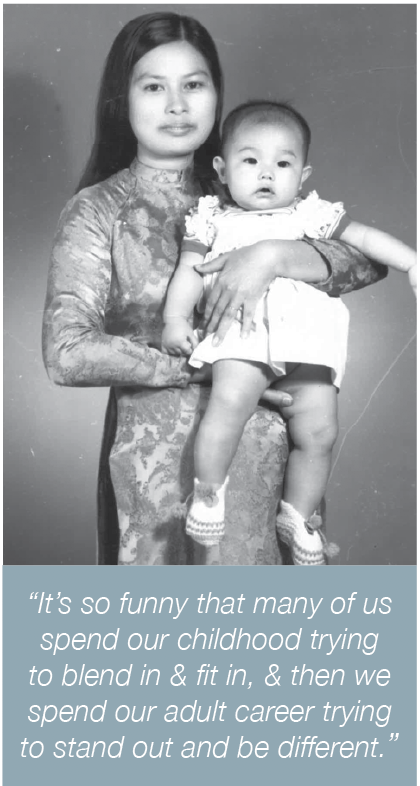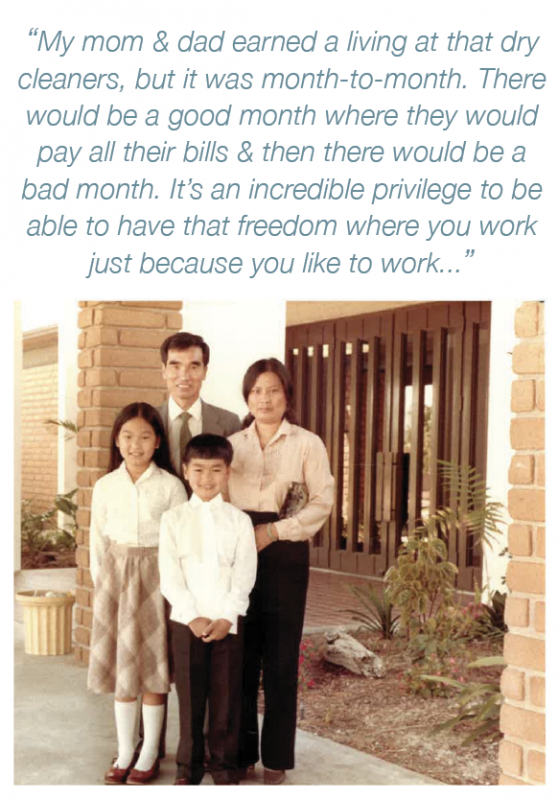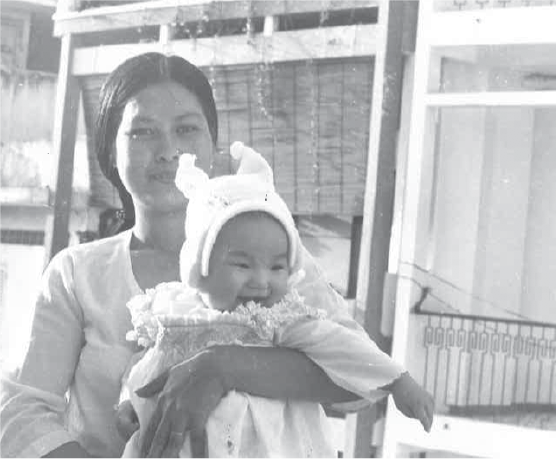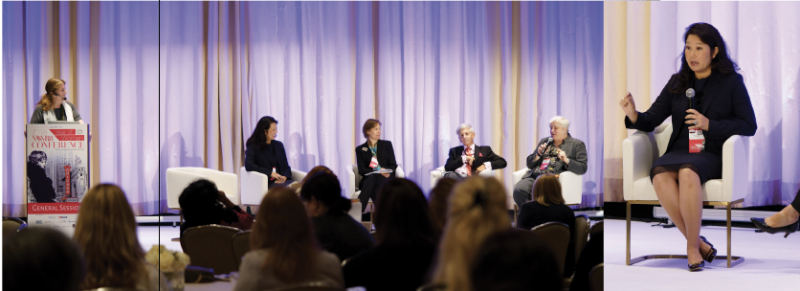Co-Founder and Partner, Virtua Partners
Quinn Palomino

Quinn Palomino is the Co-Founder and Principal of Virtua Partners, a fully-integrated, private equity and real estate services firm. In this intimate discussion with NAWRB, Quinn shares her incredible story as a first-generation Vietnamese immigrant, her experience growing up in a mix of both American and Vietnamese cultures, the words of wisdom she lives and works by, and more.
NAWRB: What was your childhood like growing up in Vietnam?
Palomino: My family evacuated Saigon, Vietnam on April 30, 1975 after the Fall of Saigon and the end of the Vietnam War. The image that many people may recall is of helicopters leaving from the rooftops of the U.S. Embassy that day. Approximately 125,000 individuals like my family evacuated and many of us were allowed entrance into the US as refugees. My family was sent to Fort Chaffee in Arkansas and provided refugee housing in the barracks at Fort Chaffee as part of the what the U.S. military called “Operation New Life.” And it was exactly that for my family and I, an opportunity at a “New Life.” We later settled in Orange County, California in a little suburb called Mission Viejo.
Every first Friday of the month families and friends came over to the house to pray the rosary in Vietnamese and a Vietnamese priest would come from LA so that we could hear the Mass in Vietnamese in the living room. Afterwards, I would hear the stories of what life was like in Vietnam, eat and share tips on how to get by in the U.S. Who is the best doctor? Where to find rare Vietnamese ingredients? You would get your tips for living in the new country and share resources. Cars were shared. I remember being shared as a translator. By the time I was about four or five years old, I was translating for my parents, relatives and other Vietnamese friends. I remember waking up and my mom saying Bac Minh or Chu Vinh or any number of family friends are going to come by and pick you up, and you need to go to the doctor’s office and fill out the paperwork for them or head over to the DMV.
I remember being handed the study and training manuals for everything from how to obtain a nail technician certification to becoming a U.S. Citizen and then told to provide training notes and to help our family and friends to study. In those days there were no Vietnamese translated versions of these things. I would help friends to prepare for written, and especially for verbal, exams. “If they ask you this… repeat after me…. Say this…. Again.” Then I would anxiously wait for them to come back home on exam or interview day, praying that they had passed.
Looking back on it now, I think these experiences forced me to learn how to break things down in a way that others could understand and to find a way to explain a subject by using something that they could relate to. I find myself doing this every day at work and outside of work. I think I also learned how rewarding it feels when you can provide some value, some kind of service to those around you. It gave me a sense of being a part of a community.
 NAWRB: What was it like acclimating to American culture?
NAWRB: What was it like acclimating to American culture?
Palomino: It’s so funny that many of us spend our childhood trying to blend in and fit in, and then we spend our adult career trying to stand out and be different. In my family, I was told to blend and to not cause a scene. I was constantly trying to fit in. I look different, I dress different, the food that I would bring for lunch smelled different and not in a good way.
When I didn’t quite fit in. I got lost in reading. My parent’s dry cleaners was down the street from the local public library and I went there every day after school to pick out a book to read. I loved to get lost in the worlds of Jane Austen and F. Scott Fitzgerald.
NAWRB: What motivated your interest in real estate and investment?
Palomino: I worked in construction for a number of years and I find it very rewarding to take a vacant parcel and work on it from the early design process to final walk-through of the completed building.
My parents worked from early morning to late at night at their dry-cleaning business just to make ends meet. It was hard to ever get ahead. There just never seemed to be enough hours in a day to get ahead. It feels highly productive to me that while our investors are out enjoying life or working on other activities, their dollars are working for them. We can’t add more hours to the day to work, but we can make each dollar work smarter and that is what investing is all about.
NAWRB: Who has been the most influential person in your life?
Palomino: My business partner has been the most influential person in my life. Years ago, when I was still working in a real estate consulting firm, he pulled me aside and asked me if I had ever thought of starting my own business. He believed in me and planted that seed in my mind. Over the years he has been a regular source of wisdom and advise. Starting a business is not for everyone. Anything worth having is not going to be easy and you will need to have those around you to keep you grounded and at the same time encourage and inspire you to keep reaching.
 NAWRB: What internal development programs do you offer within your company?
NAWRB: What internal development programs do you offer within your company?
Palomino: We have strong Management Development programs, especially in our hotel management company, Hotel Equities. Not everyone is blessed to go to college. Many in our neighborhoods and communities face medical problems, financial problems, drug problems, and may have missed out on that time in their youth to pursue an education and find themselves later in life struggling to find a career or even a job. Young girls with teenage pregnancies, for example—they’re smart, driven and they’re looking for that career. If you show drive and are willing to put time into our intensive program our team can train individuals in all aspects of hotel management in six to twelve months. We’ve had a large number of success stories. We’ve had individuals who came in as front desk clerks who are now general managers and regional managers of our hotels. They take pride in their career and growth.
For general managers and regional managers with the skill and drive to continue to grow, we put those individuals in a program which we call our “Leadership Training Program.” We take them and say, “Here is a problem that we are dealing with across the company.” They have to team up and come up with ideas to solve that problem. They are leaders in their local hotel or area, and now they have this program giving them the skills and training to be the next COO, the next CEO, the next director. We’re trying to train a succession team for our company from within. That’s really exciting.
The hospitality industry average turnover is about 71 percent. Our hospitality team’s turnover rate is 24 percent. Members of our team grow with us and stay with us.
NAWRB: What have been your proudest achievements, both professionally and personally?
Palomino: Personally, family is my proudest achievement. We all make sacrifices for our family. We need to put the time into those relationships. For me it means committing to getting home by 6 pm to have dinner with them every night or catching a crazy flight home to see them before they go to bed.
I am honored every day to be working with the team at Virtua and Hotel Equities. The fact that I get to be a part of this team and to learn from them and be a part of our success as a team is an incredibly proud moment for me.
NAWRB: Do you ever take the time to celebrate your successes?
Palomino: I am afraid I am not very good at this. The last few years have been incredibly exciting and busy. Before I finish one project, the team and I are already talking about the next project. There has not been a lot of time to celebrate. I have been trying to remind myself to celebrate in small ways throughout the day.
 NAWRB: What goals do you plan to achieve in the future?
NAWRB: What goals do you plan to achieve in the future?
Palomino: Fred, the chairman of Hotel Equities looks back at a 40 year career, and Lloyd, my business partner, looks back at a 50 year career, and they each have a loving family and a team around them—a large and committed team. I think that is what success looks like. So, what it entails is a pretty big umbrella. It means doing a job well. Creating a world class team.
For years my parents didn’t quite understand what I did. They just knew that I do what I do and I do it well. When you talk about all of the components of what we do—our investors, the projects, land development, the hospitality components, multi-family and single-family residential—at the end of the day, we’re not a simple company that makes widgets. What we do is build net worth for our investors. That’s who we are and if that means that we have to explain an investment, perform rigorous underwriting, make sure our investors are diversified, explore all potential options, try to mitigate risk, that’s what we do.
I think I enjoyed the freedom in the month after opening the company. I can’t tell you how good that felt. My mom and dad earned a living at that dry cleaners, but it was month-to-month. There would be a good month where they would pay all their bills and then there would be a bad month. It’s an incredible privilege to be able to have that freedom where you work just because you like to work, because you feel like your work makes an impact. You’re not working just to feed yourself from day to day.
If we can help people learn to invest wisely in projects that potentially earn them income so they can be financially free, I love that. That means our hotels and other businesses can help people move into careers where they can afford to care for their families and put away something in savings. That’s what the future should be. Whatever we do, whatever initiatives or approach we take, I want to get to that point.
We offer people help so that they can have that financial freedom. That means a lot; it’s transformational. When you hit a point of financial freedom you just think differently. You are able to start helping family, extended family, and start to think how you can give back to the community – not to say that those who don’t have financial freedom don’t. But when you’re worried about every month and the bills you have to pay, it’s just harder.
NAWRB: What is something people would be surprised to know about you?
Palomino: I love football. I think football is a great analogy for the workplace, teamwork, goals, and how to perform under pressure. Most people don’t think “football fanatic” when looking at me.
I also love mythology and old Asian (especially Vietnamese) fairy tales. My father and my grandmother were storytellers and I love retelling stories with a moral. It connects me to my family and my heritage.
NAWRB: Virtua Partners specializes in tax-advantaged investment offerings such as Opportunity Zone Funds. How did you get involved in this,and how do you think this will impact real estate?
Palomino: The Opportunity Zone program played perfectly into Virtua’s existing investment strategy. Once we recognized the incredible tax benefits this program offers investors, we immediately put a plan in motion to become a leader in this space. The potential tax benefits of the program are unique.
The program is a great match for our core competencies since real estate development and real estate positioning will be the prime beneficiaries of the program. Our team has significant experience in real estate development and we already possess a robust pipeline of projects under development throughout the country. That experience gives us an advantage because we don’t have to learn new markets or build a project pipeline. In fact, we already have existing projects in Opportunity Zones.
We believe the impact of Opportunity Zones will be felt across all real estate markets, as it helps bring supply and demand more into balance. Anytime you incentivize private capital to flow into areas that might not have otherwise received that capital, you are providing a social benefit to the community.
Because there are Opportunity Zones in every state, developers can target specific areas based on housing supply, expected returns, community needs or any number of other factors. Long term, we see real social impact, both in high-growth areas, as well as in areas that need the subsidy to be viable for development.

NAWRB: What other trends should we look out for in real estate investment?
Palomino: More tax structured investments. Given the size of the fiscal deficit, tax rates are going to have to increase. Investments that are structured to take advantage of Opportunity Zones, low income housing tax credits and similar tax breaks, will become increasingly popular as investors attempt to boost after-tax returns.
We are focusing our efforts on developments in high-growth areas due to an influx of new workers and the overall growing millennial generation moving into the housing market. Specifically, we are focused in Sun Belt metro areas like Phoenix, Austin and Atlanta. We have a focus on hospitality and residential rental properties. We view single-family rental properties as a great investment area that is gathering a lot of attention. Millennials want to move out of the city as they grow older, but still lack the capital to afford homes. These single-family rental homes give millennials the chance to live in a great home out of the city without the upfront costs. It’s a trend we expect will develop as more and more millennials look to begin forming families.
We also see social impact as a big trend moving forward. Many of our investors want to make sure they are helping the communities in which they are investing. We are currently working on several initiatives to help measure, track and enhance the social benefit of our investments.
NAWRB: You are the founder and owner of five integrated real estate firms. Did you face any obstacles building each of them, and was it difficult to find support?
Palomino: I have been used to solving problems over the years – doing it myself. Learning to trust that others could do it even better than me, finding those individuals and then creating an environment that would allow them to grow to their full potential has been one of the goals I strive for every day.
At the end of the day, deals come and go, projects get completed, but the people you have around you, they are your strongest asset – your most valuable treasure and gift. Surround yourself with people who are smarter than you, people you admire. I am always amazed when I learn how to be a better manager, a better person from those around me. I learn from the team I work with how to care for people or how to squeeze in time to read. Those around you can inspire you. We all need that inspiration. There is a Vietnamese saying that my father always shared, “If you stand next to a light you will shine, but if you stand next to ink you will get stained.” The point is this; surround yourself with those you want to be like and they rub on off on you.
NAWRB: How do you manage your time to oversee five different firms? Do you have any tips for multi-tasking and time management?
Palomino: Desiree, when you find the secret to that, please tell me. There are days that I feel like I am standing in front of a large dam sticking my fingers in leaks. And right at the moment that I am running out of fingers and toes I see a massive crack appearing above my head.
The only thing I can suggest is to really take the time to decide what is the most important thing to you – what is your main driving objective. Then try to map out the key results that have to be done to reach that objective and zero in on those items. Try to think of key results that you can measure, so that you know when you have succeeded or completed your goal. The main driving objective is your dream, your vision, that thing that you want to stretch and strive to get. But you have to think of the key steps. Visualize them. You can have more than one driving objective or dream. But be selective.
For mine, I want to be physically and emotionally healthy to enjoy my family. What does that visually look like? I don’t want to be in a hospital bed. I want to walk and dance when my daughter gets married. I don’t get to eat desserts or breads as often as I would like. I make sure I get in the door of the house by 6pm to have dinner with my family almost every night. If that dream is clearly ingrained in you, you change everything else; schedules, how long you speak, what you work on to get to that goal, etc. I am not perfect. I am still trying to work on this. But it is working for me.
NAWRB: What are some of your hobbies?
Palomino: I love reading, hiking and painting. I enjoy biographies. I am reading Leadership by Doris Kearns Goodwin right now and she goes into detail on Abraham Lincoln, Theodore Roosevelt, Franklin Roosevelt and Lyndon Johnson. Goodwin details how they each developed into leaders. All too often we think everything is about us or our problems. I think reading about the lives of others during particular trials and how they dealt with them helps me to get a more realistic perspective. By reading and allowing new information to fill my thoughts, I feel that I am working on being a better person – better for my family, better for those I work with.
NAWRB: Knowing what you know now, what advice would you give your younger self?
Palomino: Don’t be scared. Keep trying. The perfect answer doesn’t appear out of thin air. More often, you try a solution and it doesn’t work and you change it slightly. Then it may work a little bit better but not perfectly. Change it some more. Don’t be afraid to get out there and give it a try.
Money doesn’t make you happy. Freedom does – freedom from debt, freedom to do what you want to do with your time and to speak freely. Don’t just work to get money. Work to get freedom.
When you are passionate about something, pursue it. Spend time doing things that you love, things that you are passionate about and become really good at them.
Don’t let people tell you you need to take a certain path to get to where you want to go. Love those around you and let them know it. Life is short.

 Login
Login

